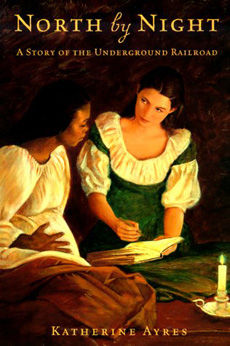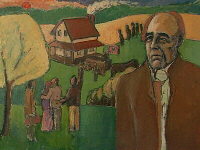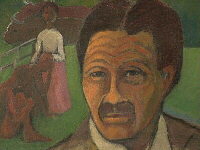Books > North by night

Lucy Spencer has been helping fugitive slaves flee to Canada since she was twelve years old. Her family’s Ohio home is a station on the Underground Railroad, the secret network of people that helps runaways escape to freedom.
Now that she’s sixteen, Lucy is thirsty for adventure. When she is asked to stay with the widow, Aurelia Mercer and help a family of runaway slaves hiding in the attic, she doesn’t hesitate. From one of the fugitives who is pregnant, and from the surprisingly unconventional Miss Aurelia, Lucy learns much about growing up, loving, and standing on her own. But what will Lucy do when she is asked to make the ultimate sacrifice?
“Told through journal entries and letters, this historical novel underscores the cruel consequences of the 1850 Fugitive Slave Act and the dangerous choices forced on Americans both black and white in the tense years leading to the Civil War.” —Publishers Weekly
Random House Yearling 0-440-22747-X (paperback) For discounted quantity purchases of North by Night, please call 1-800-726-0600. www.randomhouse.com/kids
North by Night is also available in audio tape format through Recorded Books 1-800-638-1304 or www.recordedbooks.com
The Story Behind North by Night
I found Lucinda Spencer in a trunk. Does that sound weird? It was, but we writers don’t let a little thing like weirdness get in the way of a story. Some years ago I found an interesting old trunk in a used furniture shop. I was drawn to it because of a small brass plate attached to the top, with a girl’s name (not Lucy’s) and a date. I assumed it might have been the girl’s wedding chest and couldn’t help but imagine her life—how her father must have loved her to build her such a chest and have a name plate engraved. That idea surely influenced me in the writing of North by Night. Lucy is very connected to her family and when she must spend long weeks away from them, she grows lonely and has a hard time.
Lucy herself began speaking to me in a letter. I was working on a contemporary novel in which the main character finds an old dusty trunk, very much like the one I’d just found, in the barn of her great aunt’s house. Inside the trunk is a letter written in 1951 by a girl named Lucinda Spencer, describing her life. Once I’d written Lucy’s letter, she started to come alive for me, telling me her story and inviting me to join her adventures. So I did. The story I was working on when I discovered Lucy is still stuck in the stinky manuscripts drawer, however. The characters were a lot of fun but the plot of their story still needs tons of work. Maybe someday.
Once I knew Lucy, I had much to learn about her times and the struggles of slaves to find freedom. I spent hours in libraries, traveling around northern Ohio, reading the names on old tombstones. Ideas for the incidents in the book come from many sources, including the oral history narratives told by former slaves to writers during the 1930s.
Miss Aurelia was also interesting to research. As I read about the 1850s,
I discovered numerous independent-minded women who had chosen to live by themselves. One
of the most well known was Louisa May Alcott, who noted that while some women
might wish to tie their fortunes to a man, “. . . as for me, I’ll paddle my own
canoe.” Miss Aurelia is a sister in spirit to Alcott and others who weren’t
afraid to defy convention.
North by Night was my second book and writing it was a long process. I
first wrote the novel in regular chapters, but my editor suggested rewriting
it as a journal. That meant going back very carefully, checking the dates
and figuring out exactly how long it would take letters to travel back then,
for example, or how many events might happen in a single afternoon. It
was lots of work, but as I wrote it as a journal, I grew even closer to Lucy,
a good thing for a writer to do.
One part was especially difficult for me to write. I’m an only child, so writing about a family with several kids was a challenge. Fortunately, my husband and I have three children in our family (now grown) who helped me understand how brothers and sisters interact. Difficult, in another way, were the sad parts of this story. When I wrote some of those sections I felt worn out afterwards, as if I’d actually lived through them myself as Lucy had. But I’m not sorry I wrote them. Sadness and tragedy are as much a part of life as joy and celebration. As writers, or as human beings, we can’t duck the tough spots, we just have to learn how to endure them.
Some readers write to ask why I didn’t include what next happens to Lucy and Hope in the book. If you have such questions, you’ll find some answers in Stealing South, a companion to North by Night. It’s Will Spencer’s story, but you’ll get a few hints about Lucy. Once I finish a story and it comes out as a book, in some ways the story doesn’t belong just to me anymore, it belongs to my readers. So in the long run, I do like to leave a bit of the ending in your hands, so you as the reader can continue the creative process that I begin, by imagining how her life will unfold.
Paintings depicting the Underground Railroad by Mike Brower.


